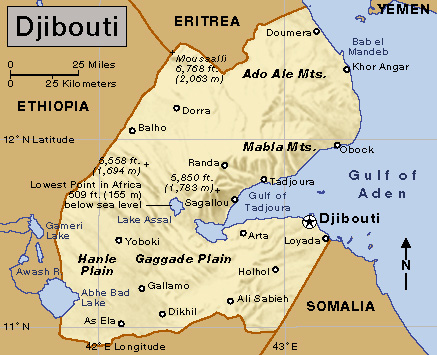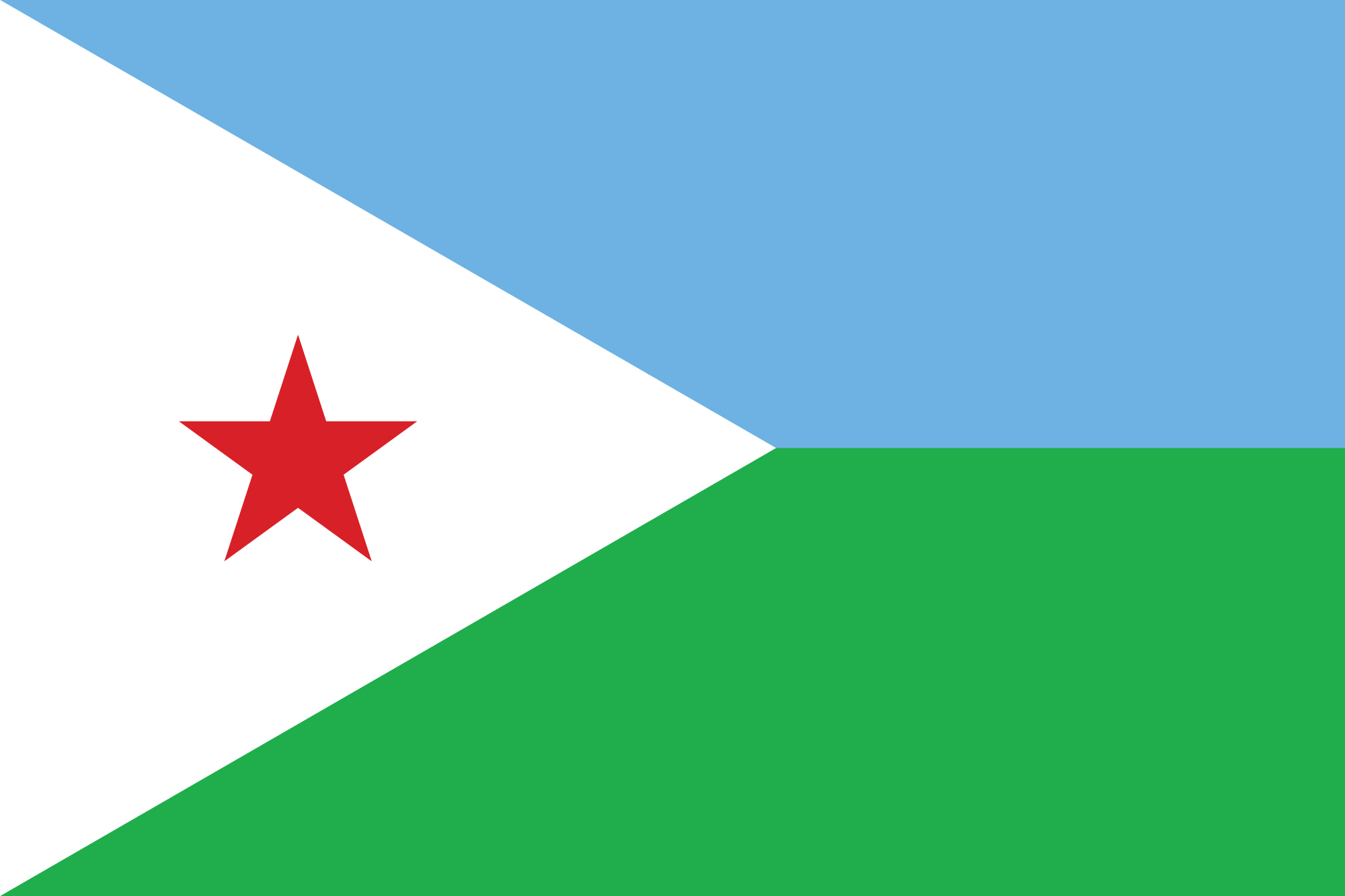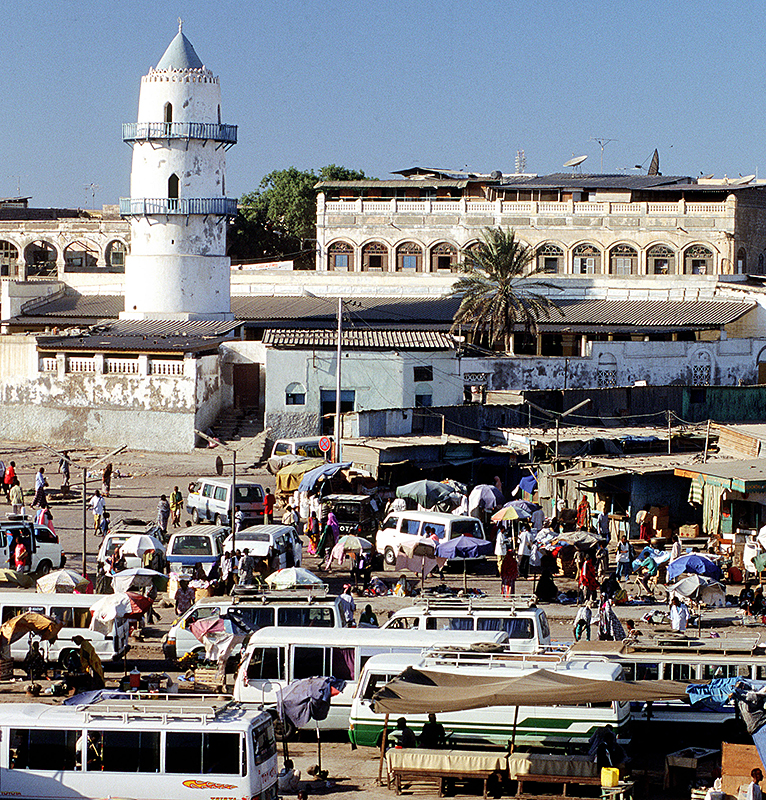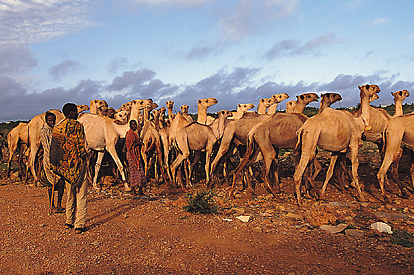Djibouti, << jih BOO tee >>, is a small country in northeastern Africa. It lies on the western shore of the Gulf of Aden. The Gulf of Aden and the Red Sea and Suez Canal to the north link the Indian Ocean and the Mediterranean Sea. Djibouti’s location has helped make the country’s capital, which is also called Djibouti, a major port. The location also has strategic importance. Ships travel freely past Djibouti’s coast. But it would be possible for a powerful nation that gained possession of the area to control the passage of vessels traveling between the Indian Ocean and the Mediterranean Sea.

Djibouti is an extremely poor country with almost no natural resources. In 1977, it gained independence from France, which had ruled the area since the late 1800’s. The French originally called the area French Somaliland, but in 1967 they renamed it the French Territory of the Afars and Issas.
Government.
The president is Djibouti’s most powerful official. The people elect the president to a five-year term. The people also elect the 65 members of the nation’s legislature, which is called the National Assembly.

People.
Two ethnic groups, the Afars and the Issas, make up most of Djibouti’s population. The Afars live in the north and west. The Issas, a Somali people, live in the south. Djibouti also has small French and Arab populations.

The Afars and the Issas have traditionally been nomads. Today, many of them still move about the countryside with herds of goats, sheep, camels, and cattle. Scorching heat, a scarcity of water, and a shortage of grazing lands make life difficult for the nomads. As a result, large numbers of Afars and Issas now live in the city of Djibouti. But poverty and a high unemployment rate plague the people who live in the capital. Many people chew khat (also spelled kat or qat)—a leaf that produces a feeling of well-being when it is chewed. Large numbers of workers spend up to 50 percent of their income on khat.
The official languages of Djibouti are Arabic and French, but most of the people speak Afar or Somali. A large majority of the people are Muslims. Educational opportunities are limited in Djibouti, but about two-thirds of the adult population can read and write.
Land and climate.
The terrain of Djibouti is extremely desolate. A barren plain stretches along the country’s coast. Farther inland is a mountain range with several peaks that rise more than 5,000 feet (1,500 meters) above sea level. A rugged plateau lies beyond the mountains. Vegetation is scarce throughout the country.
Djibouti has one of the hottest and driest climates in the world. The temperature in Djibouti averages 85 °F (29 °C), and it sometimes rises above 107 °F (42 °C) from May to October. The country receives less than 5 inches (13 centimeters) of rain annually.
Economy.
Djibouti is an extremely poor and underdeveloped country. It has no natural resources of any importance and little industry. Djibouti’s main agricultural activity is livestock herding. Djibouti imports much of its food. Djibouti’s economy is based almost entirely on the capital’s port and international airport and on a railroad that links the capital with Addis Ababa, Ethiopia. Djibouti serves as a major port for Ethiopian trade.

History.
People have lived in what is now Djibouti since prehistoric times. During the A.D. 800’s, missionaries from Arabia converted the Afars who inhabited the area to Islam. The Afars set up several Islamic states, which fought a series of wars with Christian Ethiopia from the 1200’s through the early 1600’s. By the 1800’s, the Issas had taken over a large part of the Afars’ grazing lands, and hostility grew between the two groups.
France bought the Afar port of Obock in 1862 and founded a coaling station for French ships there in 1881. The French signed agreements in 1884 with the Afar sultans of Obock and nearby Tadjoura. In 1888, the French occupied the uninhabited area that would become the city of Djibouti. They united various small possessions in the area into one territory named French Somaliland.
The French developed good relations with Emperor Menelik II of Ethiopia, who decided to have a railway built from his capital, Addis Ababa, to the city of Djibouti. In 1897, he made Djibouti the official port for Ethiopian trade. The city grew rapidly, but little development occurred elsewhere in the territory.
After World War II ended in 1945, the Issas and some other groups in French Somaliland began to demand independence from France. However, the French kept these groups under control. Against the opposition of the Issas, the territory voted in 1958 to join the French Community, an organization that linked France and its overseas territories.
In 1967, French Somaliland voted to continue its association with France and was renamed the French Territory of the Afars and Issas. But opposition to French rule grew during the 1970’s, when the Issa population increased rapidly. In May 1977, the people voted overwhelmingly for independence. The territory became the independent nation of Djibouti on June 27, 1977.
Hostility between the Afars and the Issas has continued since independence. In 1991, government forces dominated by Issas began to fight rebel Afar militants. In 1994, both sides signed a peace agreement. However, some Afar rebels continued fighting against the government. In 2000, the last remaining rebel group and the government signed a new peace agreement.
See also Djibouti [city].
